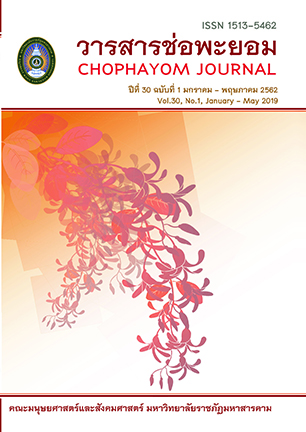A Study of Pragmatics Failure in Using of Thai Language, Intercultural Communication of Chinese Students from Yunnan Financial Economics University, China
Keywords:
Pragmatic failure, Cross-cultural Communication, Chinese studentsAbstract
This study aims to explore pragmatic failures in using Thai language for intercultural communication among 24 Chinese students who were studying in the third year from Yunnan University of Finance and Economics, China. An analysis of self-introduction essays and observation on conversations between Thai teachers and Chinese students in class were employed. The results derived from descriptive analysis revealed that the pragmatic failures could be classified into four dimensions: 1) an inappropriate use of nouns and pronouns 2) a contamination of (Chinese) mother-tongue sentences 3) a usage of incorrect-meaning terms 4) a utilization of words for unsuitable levels and contexts. In order to reduce deficiencies and increase learning efficiency of the learners, this study suggests that a promotion of cultural learning and language skills development in communicating across Thai-Chinese cultures, together with a principal pragmatic
teaching, would encourage students to learn techniques and thinking process of native speakers in various communicative situations and to apply these skills effectively in the future. Keywords : Pragmatic failure, intercultural communication, Chinese students
References
คำแหง ฉบับมนุษยศาสตร์ ปีที่ 31 ฉบับที่ 1. กรุงเทพมหานคร.
เมตตา วิวัฒนานุกูล. (2548). ลักษณะและปัญหาการสื่อสารต่างวัฒนธรรมในบริษัทนานาชาติในประเทศไทย. กรุงเทพฯ : สำนัก
พิมพ์จุฬาลงกรณ์มหาวิทยาลัย.
ศิวริน แสงอาวุธ. (2560). วิเคราะห์ข้อผิดพลาดในการเขียนภาษาไทยของนักศึกษาจีนที่เรียนสาขาวิชาภาษาไทยในมณฑลยูนนาน
ประเทศจีน.วารสาร มจร.สังคมศาสตร์ปริทรรศน์. กรุงเทพมหานคร.
ทรงธรรม อินทจักร. (2550). แนวคิดพื้นฐานด้านวัจนปฏิบัติศาสตร์. สำนักพิมพ์มหาวิทยาลัยธรรมศาสตร์. กรุงเทพฯ.
ดวงทิพย์ เจริญรุกข์ เผื่อนโชติ และพัชราภา เอื้ออมรวนิช.(2557).การปรับตัวของนักศึกษาจีนที่เข้าศึกษาต่อในมหาวิทยาลัยราชภัฎ
ธนบุรี.นิเทศศาสตร์ปริทัศน์.
จินดารัตน์ ธรรมรงวุทย์. (2553). ข้อบกพร่องเชิงวัจนปฏิบัติศาสตร์ในการสื่อสารระหว่างวัฒนธรรม : กรณีศึกษาการใช้ภาษาไทย
ของผู้พูดชาวอเมริกันและชาวจีน ; วิทยานิพนธ์ตามหลักสูตรศิลปศาสตร์มหาบัณฑิต สาขาภาษาศาสตร์เพื่อการสื่อสาร
มหาวิทยาลัยธรรมศาสตร์.
นวลทิพย์ เพิ่มเกษร. (2551). ปัญหาการใช้ภาษาไทยของนักศึกษาจีนที่เรียนภาษาไทยในฐานะภาษาต่างประเทศ. วารสารวรรณ-
วิทัศน์ ปีที่ 8 เดือนพฤศจิกายน. กรุงเทพมหานคร.
Huang Xichang. (2556). ผลกระทบของการสื่อสารต่างวัฒนธรรมที่มีต่อการปรับตัวของครูชาวจีนที่สอนภาษาจีนในกรุงเทพมหา
นคร. วิทยานิพนธ์หลักสูตรบริหารธุรกิจมหาบัณฑิต สาขาวิชาบริหารธุรกิจ(ธุรกิจระหว่างประเทศ) คณะบริหารธุรกิจ
มหาวิทยาลัยธุรกิจบัณฑิตย์.
Gass, Susan & Selinker, Larry. (eds). (2008). Second Language Acquisition: An Introductory Course.New York :
Routledge/Taylor and Francis Group.
Kwanjai,Phat,Anchalee. (2018). 社会称呼语运用的偏误分析与对外汉语教学策略研究--以中国重庆大学和重庆外国
语大学的泰国留学生为例. (2018). https://www.tci-thaijo.org/index.php/ejChophayom/issue/view/10332
Leech G. (1983). Principles of Pragmatic. London : Longman.
Selmer, J. (2006). Language ability and adjustment : Western Expatriates in China. Thunderbird International
Business Review. 48(3) : 347-368.
Thomas J. (1983). Cross-Cultural Pragmatic Failure. Beijing : Beijing Foreign Language Press.
Jiang, X. (2006). Towards intercultural communication : from micro to macro perspectives. Intercultural
Education, 17(4), 407-419.
Kasper and Rose. (2002). Pragmatic Development in a Second Language.Language Learning : A Journal of
Research in Language Studies, v52 suppl 1.
Lan Xialing. (2014). 泰语习得者的跨文化语用失误分析及教学策略[J].创新教育.
Qin Pu. (2012). 泰语教学中跨文化培养交际能力的探讨[J]. 南京职业技术学院学报.






